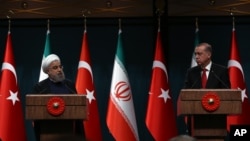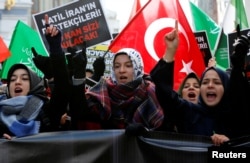Tensions are on the rise between Turkey and Iran. A growing war of words between the countries' diplomats has brought to the surface simmering competition for influence in the region.
“Iran is an important neighbor to us. We have always been in dialogue with Iran. But it does not mean we will ignore Iran’s efforts in penetrating the region,” said Turkish presidential spokesman Ibrahim Kalin in the latest thinly veiled threat between the countries during his weekly news conference.
Kalin was responding to comments by Ali Akbar Velayati, a key adviser to Iranian Supreme Leader Ayatollah Ali Khamenei, who told Turkish soldiers to leave Iraq and Syria, or the people would “kick them out.”
“They are very serious, I mean the competition between Iran and Turkey, everyone knows it, it's like two elephants in a small room,” warns political consultant Atilla Yesilada of Global Source Partners. “Iran is clearly an expansionist country, their goal of building a Shia circle all the way from Tehran to Lebanon is no secret, at least from the Turkish perspective.”
Experts say religious sectarianism underscores the tensions between predominantly Shia Iran and mostly Sunni Turkey.
Turkish president Recep Tayyip Erdogan likes to present himself as a protector of Sunni Muslim rights and has accused Iran of pursuing a policy of religious sectarianism, a charge Tehran denies. Earlier this month, Erdogan accused the Tehran-backed Hezbollah movement of being a terrorist organization.
Danger of overreach
But there are voices in Turkey questioning whether Ankara is in danger of overreach. “What is our military strength, what is our foreign policy strength, what is our intelligence strength,” asks former senior Turkish diplomat Aydin Selcen, suggesting Ankara should consider tempering its confrontational stance. “Are we a regional power? Yes. Are we a global power? No. Are we a regional power which can have its way in all issues? No, we have to work with other regional powers like Iran.”
Erdogan has been turning to other Sunni countries in the region for support.
This month, he visited Saudi Arabia and the Gulf States for talks observers say focused on curtailing Iran’s influence. Analysts suggest Ankara’s assertive stance could be influenced by U.S. President Donald Trump.
“With Trump, flexing his muscles against Tehran, Ankara may have sensed an opportunity to bring this antagonism into the open and to finally resolve this longstanding low level conflict in Syria and Iraq space,” suggests consultant Yesilada.
Proxy wars
But he warns Ankara could pay a heavy price. “That of course is also very costly, for one thing we have a gas deal with Iran, we have great hopes of economic cooperation. And finally of course Iran is not a country that easily gives up on its strategic advantages and currently it holds the upper hand in Iraq and Syria,” said Yesilada.
The repercussions for Ankara are not likely to be confined to trade, with Tehran being an expert in fighting proxy wars. Regional reports say Tehran is seeking to court Kurdish insurgent group the PKK and its affiliates across the region.
“Iran may use the Kurdish card. Turkey has been accusing Iran in the past of somehow harboring and assisting the PKK,” claims political columnist Semih Idiz of the Al Monitor website. “But there is a dilemma. Iran has its own problem with its own restive Kurdish minority, is it could get its own hands burned.”
Turkey, the United States and the European Union consider the PKK a terrorist organization.
Iran unshackled
Despite the dangers of confronting Tehran, analyst Yesilada suggests Ankara believes it has little choice. “Iran, unshackled from international sanctions from its nuclear expansion, will hem Turkey in and we will be unable to trade with our Arab partners, once it completes its Syria and Iraq project,” predicts Yesilada.
Analysts suggest Iranian-Turkish tensions are set to continue to rise as they jockey for influence.
Both countries, historic regional powers, have a long history of managing their conflicting interests and balancing rivalry, and cooperation is often how bilateral relations are characterized. Idiz predicts the latest bout of tensions will test that balancing act.
“We are coming to a very decisive moment in Syria and Iraq and these [Iranian-Turkish] tensions are a product of that. But the two countries have a tradition of trying not to allow differences to boil over. But what this latest diplomatic exchange has done has shown everybody that the two countries are very much on different sides in the Middle East. The danger is if some kind of accident, if there is a clash between Iranian and Turkish-supported forces, then things could get out of hand given both countries have very nationalistic populations,” said Idiz.





